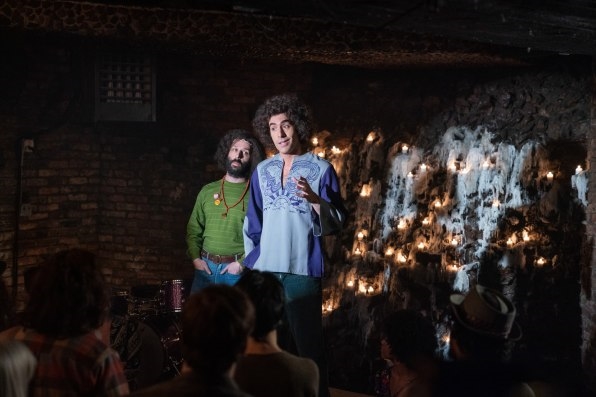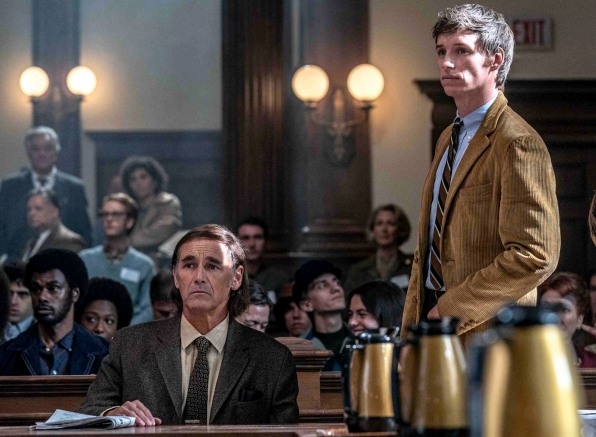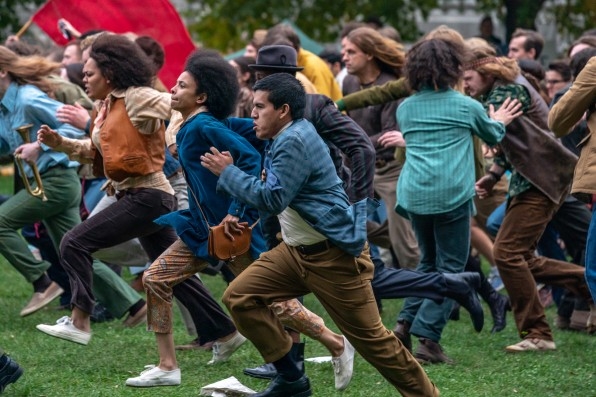Die-hard fans of Aaron Sorkin may be experiencing a case of whiplash at the moment.
After Thursday night’s reunion of the creator’s beloved tribute to bipartisan compromise, The West Wing, Friday, Oct. 16, saw the release of his new Netflix film, The Trial of the Chicago 7. The former was a call to civic action, in which liberal luminaries such as Lin-Manuel Miranda urged viewers to vote—despite the unlikelihood that any hadn’t already planned to do so—while the latter is a meditation on what it means to take more direct political action.
The self-congratulatory pablum of the former is at odds with the complicated concepts of the latter—which are ultimately rendered in as Sorkin-y a manner as possible.
In talking with Fast Company about the reunion special recently, one of the world’s greatest West Wing skeptics, screenwriter Josh Olson, lodged the following complaint about the show’s cast and creator urging viewers to vote, in a moment that was left out of the article:
“It seems to be a way to kind of breed and promote complacency,” he said. “It’s funny that that whole crowd really fucking hates Susan Sarandon. She may be on Twitter right now saying, ‘Go vote,’ but that’s in between tweeting photos of herself chained to a fence and marching and going, ‘Come on out! Join us! Get bodies in the streets and get active and organized!’ That’s scary. That’s a sacrifice. That stuff takes time and money and blood. And it’s just much easier to sit in your comfy house and lecture people on voting.”
The Trial of the Chicago 7 is evidence that Sorkin has at least considered this contradiction. It’s a thoroughly watchable cinematic examination of the events surrounding the police riot at the 1968 Democratic National Convention. The filmmaker sets the scene by introducing us to leaders from disparate left-leaning groups such as the Students for a Democratic Society, the Youth International Party, and the Black Panthers, as they gear up to make a stand against, alternately, the Vietnam War and the U.S. police state in general. He then picks up the action six months later, as the incoming Nixon administration seeks to make an example out of those leaders for the riot that followed. Along the way, Sorkin fills in the details on what actually went down during the night in question, with an expertly paced trickle of flashbacks. (I may object to his politics, but I can’t argue with his command of structure.)

[Photo: Niko Tavernise/Netflix]
Considering that Sorkin originally wrote the screenplay in 2007, and went into preproduction in 2018, the timing of this film is remarkable. It couldn’t be more relevant. The protest movement sparked by George Floyd’s killing at the hands of an officer back in June put the police response to civil unrest directly under the microscope. Unlike during the similarly turbulent era of the film, however, everyone now has a phone-camera and means to distribute video instantly. Suddenly, the police version of how riots unfold is no longer merely accepted as read. People at home can watch with their own eyes as officers cover up their badges and force nonviolent protesters into reacting.
Also mirroring the events of the film: Donald Trump’s recent attempts to use rioters as props for his election the way Nixon did in 1968, and a series of unfit, Trump-appointed judges continuing the legacy of the film’s clearly biased judiciary, embodied with Harry Potter villain-level subtlety by Frank Langella. Not to mention the fact that the inciting incident of the film involves leftists being mad at a Democratic candidate and former VP (Hubert Humphrey) for not appealing enough to the left. The parallels to now are, more or less, apparent in nearly every scene.
Sometimes the characters seem to talk directly to 2020 viewers, as when Black Panther Bobby Seale (Yahya Abdul-Mateen II) is warned that his words, “Fry the pigs,” will be taken out of context. This summer, Trump and his surrogates like to claim that Black Lives Matter protesters regularly chant, “Pigs in a blanket, fry ’em like bacon” at police, despite the fact that only one protest on record is known to have featured that chant, and it took place in 2015, without the participation of Black Lives Matter organizers. Other times, the characters speak in classically clever Sorkin dialogue, like when the least notorious member of the Chicago 7 remarks of his inclusion in the group, “This is the Academy Awards of protests and as far as I’m concerned, it’s an honor just to be nominated.” Much of the dialogue during the courtroom scenes, though, comes from actual transcripts.

Mark Rylance plays defense attorney William Kunstler (left) and Eddie Redmayne is civil rights and anti-war activist Tom Hayden in The Trial of the Chicago 7.
[Photo: Niko Tavernise/Netflix]
Sorkin loves a courtroom scene nearly as much as he loves the idea of opposing sides setting aside their differences. He made his name writing Jack Nicholson’s courtroom outburst in A Few Good Men, based on his play and adapted To Kill a Mockingbird on Broadway with Jeff Daniels in 2018. As the title suggests, The Trial of the Chicago 7 is loaded with such scenes. These moments alternately dangle red meat in front of viewers and reward them with what Josh Olson calls “liberal porn.”
We watch sharp lawyers coax proper context from ill-intentioned bureaucrats under oath. It’s the kind of thing observers of the singularly mendacious Trump administration are clamoring for—the chance to pin down liars and force them to answer truthfully, perhaps resulting in a Nicholsonion “Damn right, I ordered the code red!”-type jailable admission. Unlike in the world of most Sorkin projects, though, insulated as they are with wishful thinking, Chicago 7 shows how malicious actors like a biased judge can remain immune to reason in real life.
One wonders whether Sorkin was aware of the world’s long lineage of bad actors working within the justice system when he was creating his signature TV show. (He must have been; the dude clearly does his research.) Either way, this movie makes it clear that he is now. Perhaps the discovery of just how many such harmful forces occupy roles throughout the government today has led him to grapple with how to take on a system when civic norms fail.
“We’ve dealt with jury tampering, wiretapping, a defendant who was literally gagged, and a judge who’s been handing down rulings from the bench that would be considered wrong in Honduras,” lead defense attorney William Kunstler (Mark Rylance) laments at one point. “So I’m a little less interested in the law than I was when this trial began.”

[Photo: Niko Tavernise/Netflix]
If Kunstler’s disillusion appears to echo Sorkin’s own, so too does the rift between Chicago 7 members Tom Hayden (Eddie Redmayne) and Abbie Hoffman (Sacha Baron Cohen, fully in his element here), which scans as the auteur exorcising his internal struggle. Hayden is the leader of the Students for a Democratic Society—a reasonable, rational incrementalist who will get his hands dirty if need be—while Hoffman is a flashy, motormouthed, Molotov-tosser, both figuratively and otherwise. The two clash over the importance of winning elections to further goals (Hayden) versus the importance of cultivating a revolutionary attitude in the masses using forceful spectacle (Hoffman).
“My problem with you,” Hayden says to Hoffman in a heated clash, “is that for the next 50 years, when people think of progressive politics, they’re gonna think of you. They’re gonna think of you and your idiot followers, passing out daisies to soldiers and trying to levitate the Pentagon.”
It’s interesting talk from the guy who created The West Wing, a show that basically crystallized neoliberalism for the last 20 years and taught viewers it might be possible to pass a daisy to Mitch McConnell.
Perhaps Sorkin is sick of doing things the Hayden way, though, and ready to go into Hoffman mode?
Perhaps not.
The emotional low point of the movie comes when a secret recording of one of the Chicago 7 is uncovered, with words that can be construed as an incitement of violence, while the high point is a climactic piece of righteous courtroom grandstanding that makes the hack judge big mad.
The only form of direct action that’s permissible in Sorkin’s telling is the kind that rises to the level of insolence—despite the abject, inhuman cruelty on the other side of it.
That cruelty manifests most clearly in the film with the fate of revolutionary socialist, Fred Hampton (Kelvin Harrison Jr.), who appears briefly, as courtroom counsel to Bobby Seale. Later, he is murdered off-screen in what was later proved in real life to be an extrajudicial killing by paramilitary police. It’s tasteful for Sorkin not to dwell on the details of Hampton’s death, because it’s a different story altogether for another auteur to tell. But Hampton’s may be the more urgent, useful story for this moment. (Don’t worry, the movie version is coming in 2021.)
The Chicago 7 were made into ideological martyrs to burnish the credibility of the original “law and order” presidency. Hampton, however, was actually martyred, in the biblical sense, to prevent his ideological message from spreading any further than the charismatic 21-year old had already spread it.
If Sorkin is well aware of the system that sanctioned Hampton’s murder, and the many elements of it that linger today, he should be concerned that 50 years from now, he’ll be mostly remembered as a writer who made people feel good about pretending things didn’t happen that way.
(36)